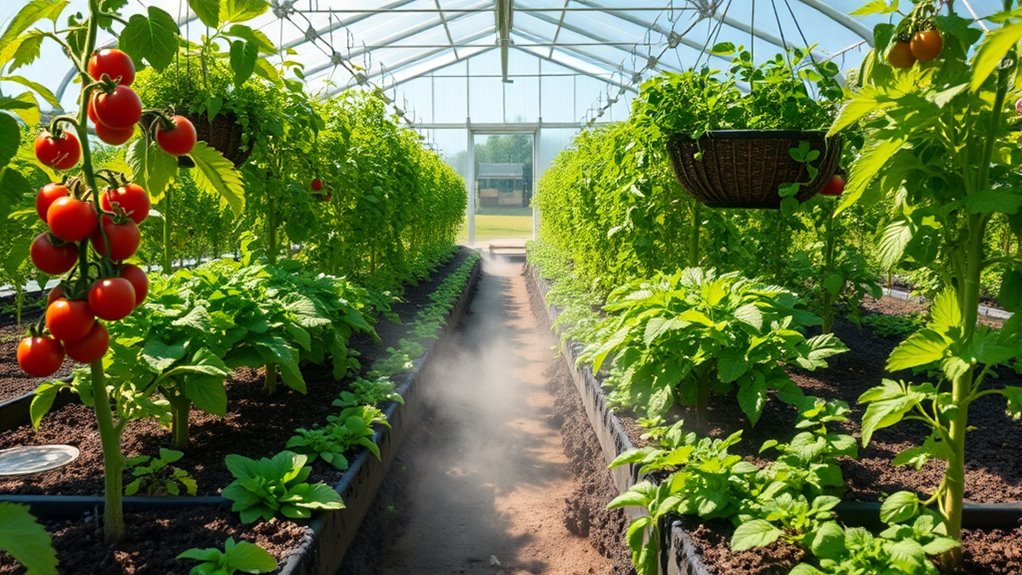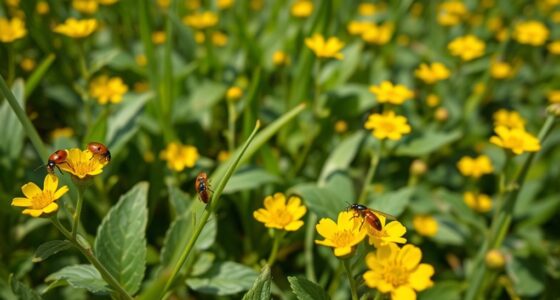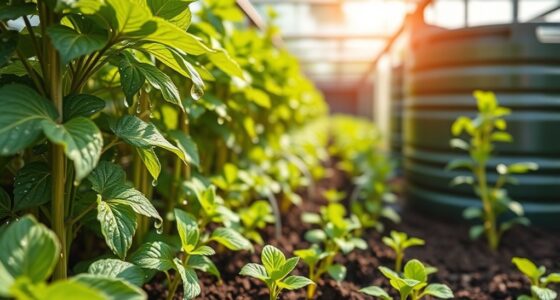Organic greenhouse farming eliminates chemicals by focusing on soil health, natural pest control, and eco-friendly practices. You can build vibrant, nutrient-rich crops through composting, crop rotation, and organic amendments that boost soil microbes and plant immunity. Instead of chemicals, you use beneficial insects, physical barriers, and manual pest removal. This approach creates resilient ecosystems that support healthy plants and reduce environmental impact. If you want to learn more about these sustainable methods, keep exploring the options available to you.
Key Takeaways
- Implement soil health practices like composting and crop rotation to grow nutrient-rich, chemical-free crops.
- Use beneficial insects and physical barriers to manage pests naturally without synthetic pesticides.
- Maintain ecosystem balance and soil microbiome health through organic amendments and diverse planting.
- Prioritize water management and sanitation to prevent diseases and reduce reliance on chemical controls.
- Focus on sustainable, eco-friendly practices that produce safe, nutritious crops while protecting environmental health.

Organic greenhouse farming offers a sustainable way to grow fresh, healthy produce year-round while minimizing environmental impact. One of the key advantages is how it promotes soil health, which is fundamental to producing nutrient-rich crops without relying on synthetic fertilizers. Instead of chemical inputs, you focus on building a vibrant, living soil through composting, crop rotation, and organic amendments. Healthy soil teems with microorganisms that naturally enhance nutrient availability, improve soil structure, and suppress pests and diseases. This not only supports the growth of your plants but also creates a resilient ecosystem that reduces the need for chemical interventions. Incorporating integrated pest management techniques further enhances the sustainability of your organic greenhouse. When it comes to pest management, organic greenhouse farming emphasizes prevention and natural control methods. Instead of pesticides, you rely on integrated pest management strategies, such as introducing beneficial insects like ladybugs and predatory mites that keep pest populations in check. Handpicking pests and using physical barriers like row covers can also help prevent infestations. These methods keep your plants healthy and free from chemical residues, guaranteeing the produce you harvest is safe and chemical-free. Maintaining a balanced environment inside your greenhouse is essential; a diverse planting schedule and avoiding monoculture can minimize pest outbreaks and reduce the chance of pests becoming resistant. Your focus on soil health directly impacts pest management, as strong, healthy plants are more resistant to pests and diseases. When your soil is rich in organic matter and microbial activity, plants develop stronger immune systems, making them less vulnerable to destructive pests. Additionally, by avoiding synthetic chemicals, you prevent disrupting the natural soil microbiome, which is indispensable for maintaining a balanced ecosystem that naturally suppresses pests. This holistic approach means fewer pest problems overall and less need for reactive measures like chemical sprays. In organic greenhouse farming, you also pay close attention to water management and sanitation to prevent disease spread, further reducing the reliance on chemical controls. Regular monitoring of plant health allows you to catch issues early, applying organic solutions such as neem oil or biological controls when necessary. The emphasis on building a healthy, resilient system ensures that pest management becomes a natural part of your farming routine, not an afterthought. Ultimately, by prioritizing soil health and employing smart pest management techniques, you create a thriving, chemical-free environment that produces safe, nutritious crops all year long—your greenhouse becomes a model of sustainable farming that benefits both you and the planet.
Frequently Asked Questions
How Does Organic Greenhouse Farming Compare in Cost to Traditional Methods?
When you compare the costs of organic greenhouse farming to traditional methods, you’ll find that organic often has higher initial expenses due to premium inputs and certification fees. However, a thorough cost analysis reveals that ongoing operational costs can be lower because of fewer chemicals and pest control measures. Market pricing for organic produce usually commands higher prices, helping offset the increased production costs and making it a viable option for sustainable farming.
What Are the Main Challenges Faced by Organic Greenhouse Farmers?
You face challenges like maintaining soil fertility without synthetic fertilizers and managing climate control for ideal plant growth. Organic farmers must carefully balance composting and natural amendments to keep soil healthy. Additionally, controlling temperature and humidity in a greenhouse without chemical aids requires diligent monitoring and natural methods. These hurdles demand extra effort and innovation, but they’re essential for producing healthier, chemical-free crops.
Can Organic Greenhouse Practices Be Scaled for Large Commercial Operations?
You might think scaling organic greenhouse practices is tough, but it’s achievable with the right strategies. While scaling challenges exist, you can meet market demand for healthier, chemical-free produce by optimizing resource use and adopting innovative techniques. Large operations often face higher costs, but focusing on efficiency and sustainable practices helps you expand without compromising quality. With dedication, organic greenhouse farming can indeed grow to meet commercial needs.
How Do Organic Greenhouses Manage Pests Without Synthetic Chemicals?
You manage pests in organic greenhouses by using companion planting, which naturally repels pests, and biological controls like beneficial insects that target harmful ones. You introduce ladybugs or predatory mites to keep pest populations in check without chemicals. These methods create a balanced ecosystem, reducing the need for synthetic pesticides, and help you maintain healthy, chemical-free crops with sustainable practices.
What Certifications Are Needed to Label Produce as Organic From Greenhouses?
Think of organic certification as a golden key opening trust in your crops. To label produce as organic, you must meet strict labeling standards that verify your methods. You’ll need to obtain certification from accredited organizations, demonstrating your compliance with organic practices. This certification guarantees your greenhouse produce aligns with national or international labeling standards, proving to consumers that your crops are free from synthetic chemicals and cultivated with integrity.
Conclusion
By choosing organic greenhouse farming, you’re not just growing healthier crops—you’re protecting your loved ones from harmful chemicals. It’s easy to worry about lower yields or higher costs, but the joy of providing pure, chemical-free food outweighs these concerns. Imagine the peace of mind knowing you’re nurturing your family’s health and supporting sustainable practices. Together, you can make a meaningful difference—creating a future where clean, safe food is accessible to all.









